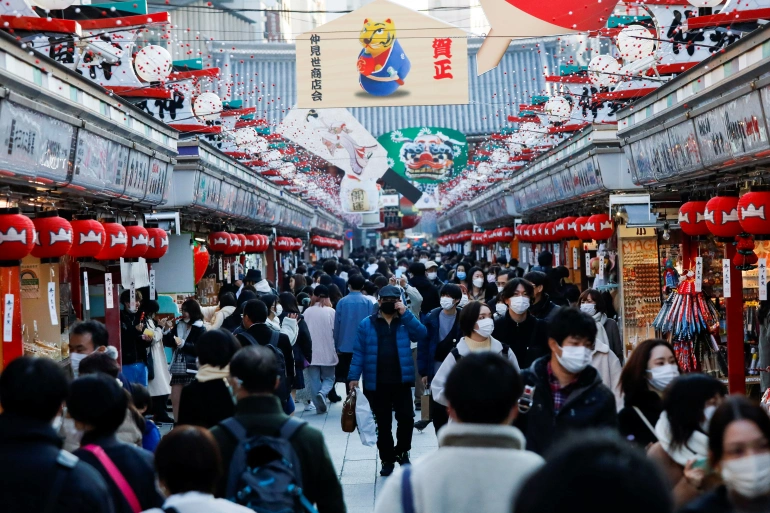Asian economies are tightening borders and in-country restrictions despite evidence of variant’s milder impact.
By John Power
Hwaseong, South Korea – Omicron is exposing an East-West divide between governments determined to halt the spread of the variant and those that see its spread as inevitable and even necessary.
While some Western countries are accepting the spread of Omicron as a step towards living with the virus, Asian economies are tightening borders and in-country restrictions to keep it at bay.
The diverging paths come amid a growing consensus that the variant is far less likely to cause serious illness and death than the Delta variant, despite spreading much faster than its predecessors, a characteristic that has nonetheless put pressure on hospitals and exacerbated shortages of healthcare workers.
Although many countries initially tightened their borders when the Omicron variant first emerged in November, authorities in Asia have shown little appetite for easing restrictions despite high vaccination rates and mounting evidence of Omicron’s lesser severity.
“Omicron is difficult to handle,” Kentaro Iwata, an infectious specialist expert at Kobe University, told Al Jazeera. “It is easy to spread, yet does not have a significant threat for the individual, mostly. However, if the denominator becomes too large to handle, then the numerator will be quite big too.”
In Hong Kong, which has followed mainland China’s strict “zero Covid” stance, authorities on Thursday banned flights from eight countries, including the United States and the United Kingdom, doubling down on border restrictions that have turned the international financial centre into one of the world’s most isolated cities. Authorities also reimposed strict social distancing rules, including forcing bars and gyms to close and banning restaurant dining after 6 pm.
In mainland China, whose borders have been sealed throughout the pandemic, authorities in the city of Xian have imposed a harsh lockdown that has resulted in food shortages and reports of medical neglect, including of a woman who miscarried after being denied entry to a hospital.
South Korea, Thailand and Singapore have mandated quarantine for practically all international travellers since last month, while Japan has banned entry to all non-resident foreigners. South Korean authorities have also banned restaurants from operating after 9 pm until at least January 16, while three Japanese prefectures have requested Tokyo approve quasi-emergency measures that include restrictions on opening hours for restaurants and bars.

Jayant Menon, a visiting senior fellow at the ISEAS-Yusof Ishak Institute in Singapore, told Al Jazeera “overreacting” to the virus could no longer be justified at this stage of the pandemic.
“Yet, we continue to see responses from governments that cannot be justified in any cost-benefit sense, even allowing for a broad margin of error,” Menon said.
“In developing countries, the cost of the continued restrictions on health outcomes, operating through loss of livelihoods and incomes, easily outweigh the direct effects of infection from a relatively impotent variant. Therefore, the only viable explanation for the continued restrictions is to try and preserve a limited healthcare system for those with the means to access it, should it become necessary. This approach is economically, socially, and morally bankrupt.”
Asia’s cautious stance stands in contrast with countries such as the US, the UK and Australia, where record-breaking case numbers are fueling perceptions that tightly controlling the variant is either practically impossible or not worth the economic and social costs.
In Australia, which implemented some of the harshest lockdowns and border controls earlier in the pandemic, Prime Minister Scott Morrison on Monday declared the “days of lockdown are gone.” State health officials in recent weeks have told the public to accept that everyone will get Omicron, although some authorities have reintroduced curbs to blunt surging cases, with New South Wales on Friday suspending elective surgeries and banning singing and dancing in hospitality venues.
Officials have also repeatedly relaxed testing and isolation rules to alleviate disruption to businesses and supply chains caused by record numbers of people testing positive for the virus.
In the UK, Boris Johnson on Wednesday expressed hope the country would “ride out” the current Omicron without further restrictions.
Although Omicron, which is believed to be 2-3 times more transmissible than Delta, has put pressure on hospitals in both countries, deaths and intensive care cases remain below previous peaks. In the UK, where the first Omicron case was discovered six weeks ago, the number of patients in mechanical ventilation beds is less than one-quarter of their January 2021 peak.
In South Africa, where the variant was first discovered, excess deaths during its Omicron wave peaked at less than one-fifth of the toll suffered during the country’s Beta variant-fuelled wave in January last year. Paul Glasziou, the director of the Institute for Evidence-Based Healthcare at Bond University in Australia, has estimated the variant to be about one-third as deadly as Delta for people who are unvaccinated and less deadly than the flu for the vaccinated.
‘Deliberate and carefully phased’
Ooi Eng Eong, a professor of emerging infectious diseases at Duke-NUS Medical School in Singapore, told Al Jazeera he believed countries with high vaccination rates could “begin to ease off” on restrictions that were instituted before vaccines, but doing so would be an art as much as a science.
“I think that each country will need to inform and prepare the population on scaling back on any measure,” Ooi said. “If not, misconceptions coupled with often widely distributed misinformation can lead to mistrust in public health authorities, which could erode any COVID prevention programme rapidly. Scaling back on measures will likely benefit from being deliberate and carefully phased.”
Thira Woratanarat, an epidemiologist at Chulalongkorn University in Bangkok, told Al Jazeera he did not believe Asian countries were overreacting to the variant given healthcare capacity and vaccine access constraints, particularly in poorer parts of the region.
“If they loosely control the epidemic, when it abruptly occurs at a very high and rapid rate, they will encounter a catastrophic moment and hardly control the situation,” he said.

Source: ALJAZEERA

